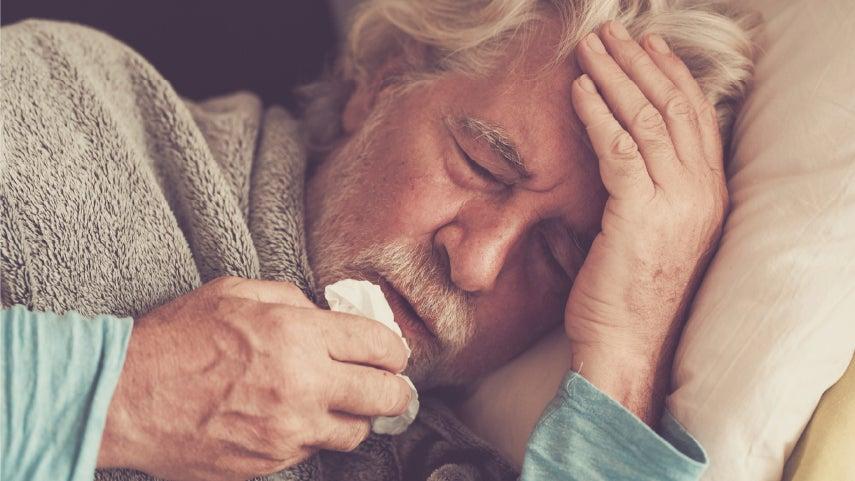What Older Adults Should Know About COVID Antivirals and Treatment Options
5 min read

Related Topics
As we get older—and our immune system isn’t as resilient as it used to be—our risk of serious illness from respiratory viruses like COVID is higher.
“But the upside is there are medications available that can lower your odds of getting very sick, needing to be hospitalized, or even dying from COVID,” said Dorothea Vafiadis, Senior Director of NCOA’s Center for Healthy Aging. “Knowing your options can help you act quickly if you test positive and reduce the chance of a severe infection.”
Why timely COVID treatment is crucial for older adults
COVID can affect anyone, but age remains the strongest risk factor for severe disease. People age 65 and older are more likely to develop complications like pneumonia, acute respiratory failure, and damage to organs like the heart and liver. Between July 2024 and May 2025, cumulative COVID-associated hospitalization rates were highest among adults age 75 or older, followed by adults age 65-74.1
Other people more likely to get very sick from COVID include:
- Those with health problems such as lung disease, heart disease, diabetes, or a weak immune system
- People who have never received a COVID vaccine or are not up to date on their COVID shots
What types of COVID medications are currently available?
The U.S. Food and Drug Administration (FDA) has approved several treatments for mild to moderate COVID in people who are more likely to get very sick with the virus. These treatments must be prescribed by a health care provider:
- Antiviral treatments target specific parts of the virus to stop it from multiplying in the body, helping to prevent severe sickness and death. These medications work best when started soon after symptoms begin—usually within five days of testing positive. That’s why it’s important to get tested right away if you feel sick.
- Monoclonal antibodies are administered before exposure to the virus to provide another layer of protection for people at high risk. This preventive COVID medication helps the immune system recognize and respond more effectively to the virus.
The following table gives a summary of FDA-approved or FDA-authorized COVID treatments:
|
Treatment |
When given |
How given |
|
Nirmatrelvir with Ritonavi Antiviral |
Start as soon as possible: must begin within 5 days of when symptoms start |
Taken at home by mouth (orally) |
|
Remdesivir (Veklury) Antiviral |
Start as soon as possible; must begin within 7 days of when symptoms start |
Intravenous (IV) infusions at a health care facility for 3 consecutive days |
|
Molnupiravir (Lagevrio) Antiviral |
Start as soon as possible; must begin within 5 days of when symptoms start |
Taken at home by mouth (orally) |
|
Pemivibart (Pemgarda) |
Preventive; given at least 2 weeks after receiving a COVID vaccine |
Single intravenous (IV) infusion over 60 mins at doctor’s office or clinic |
Some COVID treatments might have side effects or interact with other medications you are taking. Ask your health care provider if medications to treat COVID are right for you. If you don't have a health care provider, contact your local community health center or health department.
If you are hospitalized with COVID, your health care provider might use other types of treatments, depending on how sick you are. These could include medications to treat the virus, reduce an overactive immune response, or address COVID complications.
What is COVID rebound?
Sometimes, COVID symptoms return—or you may test positive again—about three to seven days after you feel better from the first illness or you test negative for the virus.
While the rebound phenomenon has been linked with taking the antiviral Paxlovid, a review by the Centers for Disease Control and Prevention (CDC) debunked that theory. CDC now states rebound can happen whether or not you took an antiviral medication. Symptoms are usually mild and go away within a few days.
What’s more, research shows rebound does not increase the risk of severe illness. If you are at higher risk for serious COVID disease, the benefits of taking treatment outweigh the chance of rebound.
If you think you may be experiencing COVID rebound, contact your health care provider.
Medications NOT approved for the treatment or prevention of COVID-19
Some drugs have been talked about in the news or online, but they are not approved or recommended for treating COVID. These include:
- Ivermectin (commonly used to treat parasites in humans and animals)
- Hydroxychloroquine or chloroquine, a prescription drug used for malaria or certain autoimmune diseases
- Antibiotics (such as azithromycin), which fight bacteria—not viruses
Using these medications to treat a COVID infection has not been proven safe or effective. They may cause harmful side effects if taken in the wrong way or without a doctor’s supervision.
High blood pressure medications and COVID
If you take medicine for high blood pressure (like ACE inhibitors or ARBs), you may have wondered whether it’s safe to keep using them if you get COVID. Early in the pandemic, there was confusion about whether these drugs made COVID worse. But evidence now shows it’s safest to continue their use.
If you get COVID, keep taking your high blood pressure medications as directed. Stay in touch with your health care provider, especially if you notice new or worsening symptoms.
What should I do if I think I have COVID?
If you fall into the high-risk category:
- Get tested quickly if you develop COVID symptoms such as fever, chills, cough, or shortness of breath. See our guide to COVID testing for older adults.
- Call your doctor right away if you test positive, even if your symptoms are mild.
- Let your doctor know about all the medicines you take in case you need COVID treatment, since some antivirals may interact with certain drugs.
- Keep taking your regular medications as directed.
- Use over-the-counter medicines like acetaminophen or ibuprofen to manage your symptoms as necessary.
- Don’t wait to start treatment. If you’re prescribed antiviral medication, don’t put it off. COVID treatments work best when they’re started within days of getting sick.
Stay up to date on your COVID vaccine
Since the COVID virus is constantly evolving, the vaccine is updated each year to target new variants. Getting your shot restores strong protection.
Updated CDC Advisory Committee on Immunization Practices (ACIP) guidance recommends that COVID-19 vaccination for everyone age 6 months and older be a personal decision made with a health care provider.
“At NCOA, we support vaccines as a safe and effective way to protect both yourself and your community,” Vafiadis said. “For older adults and people with certain chronic health conditions, these vaccines are proven to be safe and effective at preventing severe illness, hospitalization, and death. We encourage older adults to talk to their doctor and get the updated 2025-2026 COVID, flu, and RSV vaccines. It’s the best way to protect your health, independence, and quality of life.”
Source
1. CDC National Center for Immunization and Respiratory Diseases. Current Epidemiology of COVID-19. June 25, 2025. Found on the internet at https://www.cdc.gov/acip/downloads/slides-2025-06-25-26/02-MacNeil-COVID-508.pdf



